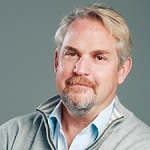 |
| Google's Andy Conrad |
Google ($GOOG) has just swept aside any lingering questions about how seriously it is taking its life sciences operation. Now, instead of operating as part of the experimental Google X, life sciences is to sit alongside the legacy internet search unit as one of a clutch of businesses operating under the Alphabet umbrella.
The rejig puts life sciences at the forefront of the newly-restructured organization. Until now, the life sciences unit has worked alongside teams developing self-driving cars, drones, balloons to deliver WiFi and other ideas that look more like academic longshots than near-term commercial successes. Having hidden life sciences away in Google X for three years, management has now decided the operation is ready to graduate. The unit will sit alongside Google's traditional internet business, smart thermostat firm Nest and broadband service Fiber as part of the conglomerate Alphabet.
With Calico, the life extension biotech helmed by Genentech legend Art Levinson, also operating as a standalone unit within Alphabet, the fields of life sciences and drug R&D are well represented within the new organization. Google will continue to insulate the standalone units to an extent, for example by only reporting revenue for its internet business and Alphabet as a whole. But in moving life sciences up to the status of a standalone unit under the oversight of current chief Andy Conrad, Google is implying that it sees the business having the potential to fend for itself in the future.
Projects initiated by the 150-person life science team, notably the Novartis ($NVS)-partnered smart contact lens, have started to edge toward commercialization, giving life sciences a potential source of income to go alongside its burgeoning research operation. "They're systematically building an infrastructure to tackle things in-house as well as collaborate with multiple universities. It's a very serious effort, and it seems to have always been supported from the very top of the company," Stanford University Professor Sam Gambhir told Wired.
- read Google's post
- here's Wired's article
- and FierceMedicalDevices' take